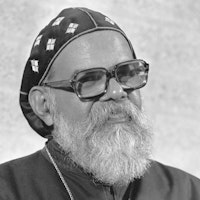It is my deep-rootedness in Christian faith that enables me to be inclusive. And this is not exclusivity: it is a partial closing, which is necessary in order to be fully open.
Paulos Mar Gregorios

To Be Fully Open
Topic: Interfaith Pathways
I see the whole of humanity in the context of my Christianness. It is my deep-rootedness in Christian faith that enables me to be inclusive. And this is not exclusivity: it is a partial closing, which is necessary in order to be fully open. God is not just transcendent; but is also immanent in the universe. The otherness and the oneness have to be kept in dialectical tension.
Paulos Mar Gregorios, born as Paul Varghese in Kochi, embarked on a journey through continents and disciplines, eventually becoming a luminary in Orthodox Christianity. His early role as a trade union leader and educational reformer in Ethiopia led to his priesthood in 1961. His academic journey took him from the United States to Oxford and Germany, where his doctoral work on Mar Gregorios of Nyssa laid the groundwork for his contributions to theology and humanism.
Upon returning to India, Gregorios's influence expanded through his roles in the church and academia, blending spiritual dedication with intellectual rigor. He served as a bishop and Metropolitan of the Delhi diocese, spearheading projects for peace, justice, and inter-religious dialogue. His work with the World Council of Churches and in international forums reflected his commitment to a faith that acts in the service of humanity.
Mar Gregorios's legacy lies in his contributions to theology, ecumenical dialogue, and social justice. As a writer and speaker, he offered insights that bridged Eastern and Western perspectives, emphasizing the harmony between spiritual and intellectual pursuits. His work inspires those seeking to understand the faith-human condition relationship, advocating for a world where truth and love form the foundation of human existence.
The Christian Heritage
Bryant, M. Darrol., et al. Assembly of the World's Religions, 1985: Spiritual Unity and the Future of the Earth: a Report. International Religious Foundation, 1986, pp. 169-175 [Metropolitan Paulos Mar Gregorios, The Christian Heritage].

Paulos Mar Gregorios
Theme: Interfaith Dialogue

About This Paulos Mar Gregorios Quotation [Commentary]
Paulos Mar Gregorios’s words illuminate a nuanced approach to faith and inclusivity, suggesting that a strong grounding in one’s faith can foster openness rather than exclusion. He posits that deep-rooted beliefs in one’s own tradition are not a barrier but a bridge to engaging with others. This perspective challenges the binary of exclusivity versus inclusivity, offering a vision where personal conviction enhances the capacity for meaningful interfaith dialogue.
Gregorios navigates the complexities of religious identity within West Asian traditions, marked by a sense of divine transcendence and chosenness. He introduces a balance between the exclusive nature of these faiths and the inclusivity sought in dialogue, emphasizing a dialectical tension between the transcendence and immanence of God. This approach suggests that acknowledging the divine within and beyond our universe enables a fruitful exchange that respects religious distinctiveness.
His insights into interfaith dialogue highlight the importance of not blurring but understanding and respecting religious differences within a shared humanity framework. Gregorios advocates for dialogue that values each tradition’s unique contributions, promoting a cooperative exploration of faith that celebrates diversity without seeking uniformity. This method respects each faith’s integrity while inviting a collective search for understanding and harmony.
Metropolitan Paulos Mar Gregorios
Pope Francis
Resources
Related Quotes
Copyright © 2017 – 2026 LuminaryQuotes.com About Us